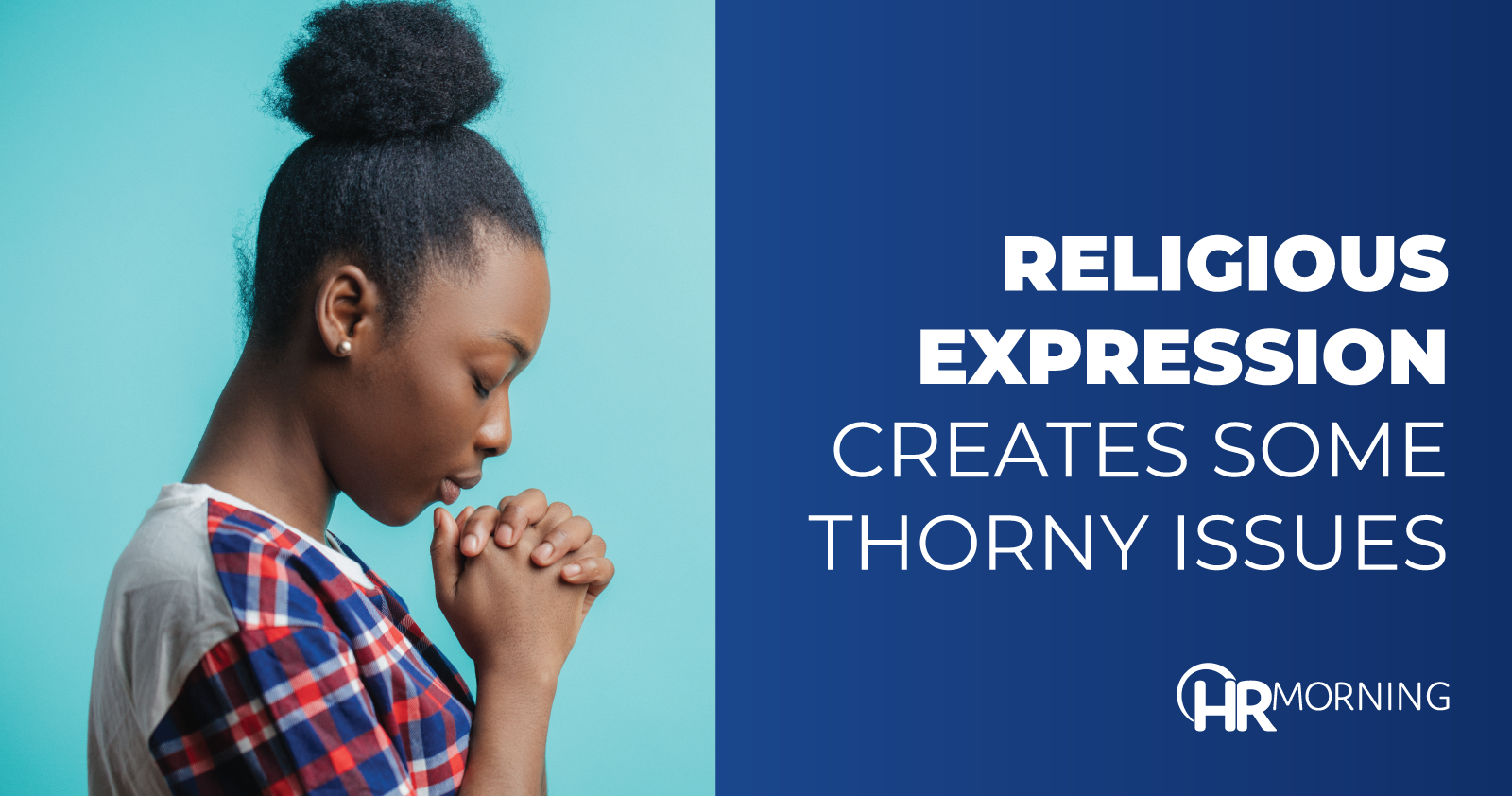Employers have a legal duty to accommodate the religious beliefs of their employees. But they also have a responsibility to protect all their employees from harassment – not to mention a legitimate interest in keeping their business running smoothly.
These competing responsibilities place employers between the proverbial rock and hard place. And when sticky situations arise, it’s important to know the rules.
Here are some guidelines to keep in mind when regulating religious expression in the workplace.
Religious expression and Title VII
Title VII is a federal employment law that bans employers from discriminating against employees and applicants based on their religion. It applies to private employers with at least 15 employees. Under this law, discrimination includes refusing to accommodate an employee’s sincerely held religious beliefs or practices. The accommodation duty is tempered by a concept called “undue hardship” – meaning that a religious accommodation is not required if it would unduly burden an employer.
A can of worms is open already, right? How do we know if a religious belief is sincerely held? And what exactly is “undue hardship”?
First things first
Let’s answer the first question first. Remember that a belief that is unique can still be religious. On the other hand, a personal preference is not a religious belief and is not entitled to accommodation under Title VII. Social, political and economic philosophies are clearly not religious beliefs.
You need to tread carefully when making the call on whether a particular belief is a personal belief or a sincerely held religious belief. Where the line gets murky, it is probably best to err on the side of caution or seek specific legal advice before proceeding.
What about “undue hardship”? What exactly does that mean?
The good news here is that when it comes to religious accommodation, undue hardship means anything more than a de minimis cost for an employer. This is a relatively easy standard for employers to meet. If a requested religious accommodation would diminish workplace efficiency, infringe on other workers’ rights, or create a safety risk, it’s probably not required. In addition, a religious accommodation is not required if it would violate an established seniority system or applicable collective bargaining agreement.
Wait a minute – proselytizing is OK?
You may be surprised to learn that in the view of the EEOC – which is the federal agency primarily responsible for enforcing federal employment law – you may be required to permit employees to proselytize at work.
The agency has expressed the position that proselytizing generally must be tolerated if it does not produce an undue hardship. Here’s some language from an EEOC Questions and Answers document on the subject:
Title VII requires that employers accommodate an employee’s sincerely held religious belief in engaging in religious expression in the workplace to the extent that they can do so without undue hardship on the operation of the business. In determining whether permitting an employee to pray, proselytize, or engage in other forms of religiously oriented expression in the workplace would pose an undue hardship, relevant considerations may include the effect such expression has on co-workers, customers, or business operations.
The clear message here: If proselytizing does not create an undue hardship, you may need to allow it.
Other limits on accommodation duty
Another clear limitation on the duty to accommodate religious expression, including proselytizing: It need not be tolerated if it is unwelcome and essentially constitutes harassment of other employees.
Another way to look at it: It would be an undue hardship to force an employer to permit harassment.
There’s an important third limitation applicable to any form of religious expression at work: It can be prohibited if it can reasonably be mistaken as the employer’s own message.
These are the relatively clear lines when it comes to dealing with religious expression at work.
Now, let’s dive in a bit deeper – and tackle some thornier situations.
Electronic communications and religious expression
Some of the more difficult questions in this area arise when employees inject religious expression into work-related electronic communications, such as emails or communications shared via an internal messaging system.
When it comes to external communications, it will generally be easier for an employer to show that religious expression can be banned because the religious message may be interpreted as its own.
That defense is not so readily available with respect to internal communications. In the latter case, employers must lean more heavily on an argument that the practice is somehow disrupting its business operations.
Some court rulings provide guidance
In a case from California, an employer terminated an employee who continued to use company email to send religious messages to other employees even after other workers had complained about them. The court rejected her wrongful termination claim, finding that accommodating the proselytizing would have produced an undue hardship. Key to the decision in that case was the fact that the employee continued to engage in the behavior even after it began to cause a disruption.
A more difficult question arises when there has been no objection by other employees to proselytizing behavior or other religious expression. In those cases, it will be more difficult to show that accommodating the behavior produced undue hardship.
In a case from Iowa, for example, an employee sued under Title VII after he was fired for using “In Christ” as a workplace email valediction. A decision in the case let the claim proceed, finding that a fact issue was present as to whether the use of the valediction caused any workplace disruption.
Blanket policies create questions
What about a blanket policy that bans religious expression in internal emails or other internal messaging systems?
First, employers should not ban religious expression via these platforms while allowing other forms of non-work-related expression. Doing so essentially amounts to what the law calls “viewpoint discrimination,” and it should be avoided.
A closer question arises if an employer bans all forms of personal expression on its electronic platforms.
Because such a ban has the effect of banning religious expression without a showing of undue hardship, it may give rise to a claim of religious discrimination. Nonetheless, at least one court has held that an employee cannot win a Title VII religious discrimination claim if they refuse to comply with a neutral and generally applicable rule.
If you are unable to produce evidence of undue hardship, harassment or improper messaging, it is risky to outright ban religious expression – including proselytizing – in the workplace.
Key takeaways
Here are some key takeaways:
- Train managers to assess whether religious expression is disrupting workplace operations.
- Don’t squelch religious expression based on mere speculation that it will produce a disruption.
- Incorporate a discussion of religious expression into anti-harassment training.
- Assess all requests for religious accommodation diligently and thoroughly.
- Promptly ban the proselytizing of any employee who has expressed a clear objection to being proselytized.



